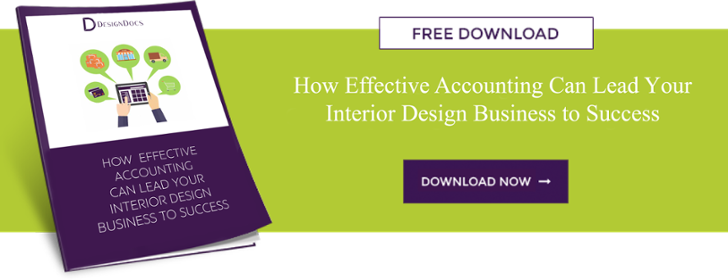Whether you’re doing your books or submitting expenses to your bookkeeper, accounting is an integral part of an interior designer’s business. But the interior design business has its own quirks, and accounting for interior designers is a bit different from other industries as a result. Accounting doesn’t need to be a daunting task, though. Get the ultimate cheat sheet on accounting for interior designers and your accounting can be a breeze!
Keep Track of Time
You bill your clients for the amount of time you spend on their projects, so you need meticulous records about how many hours you’re really logging for a client. It can be easy to simply skip tallying your time or even to lose track of time when you’re in deep on a project. But that could be costing your firm money. Like many interior designers, if you skip this step, you probably underestimate how much time you spent when you total your time after the fact. Projects can be sneaky too—fifteen minutes here, ten minutes there all add up to lost time if they’re not recorded. If you have staff, be sure to create a company policy about logging time, and designate someone to monitor and correct any problems.
Track Recoverable Expenses
When you went to a client’s space, did you travel by car or take the train? Did you have to pay for parking when you went to pick up supplies? All of these things are “recoverable” costs. You may pay out of pocket, but you can recoup them. Good accounting for interior designers is to track these kinds of expenses and bill them to your clients on their invoices. If you’re paying for parking every time you visit a project space, that can really add up. Now multiply that by the number of projects you have and you’ll see that incidental costs can take a huge chunk out of your bottom line.
Use Purchase Orders
Accounting for interior designers should always involve the use of purchase orders. Your firm engages in projects that have long lead times and that play out over the course of months. POs make your life easier. When you submit a PO, the supplier has all the information at their fingertips; there’s no need for them to go searching through emails or voicemail. There are a couple of benefits for you too: POs allow supplier errors to be caught sooner rather than later. That also means you can fast-track invoices through accounting. Since the cost of invoices can be validated against your order, there’s no confusion, making the process easier and more accurate. And with a PO in hand, expenses are easily allocated to client invoices.
Be Consistent
Invoicing can be time-consuming, and when you’re busy, it can be tempting to simply put off this task. But good accounting for interior designers requires that you set an invoicing schedule and stick to it, even when you get busy. Whether you’re invoicing bi-weekly or monthly, it’s important to be consistent so that clients remain informed. If your billing is inconsistent, clients can easily be surprised by the costs they’ve racked up—and refuse to pay, especially if costs have exceeded their budget. If you invoice consistently, clients will be aware of the current costs and be able to address any concerns they have more promptly. That means fewer concessions from you—discounts, rebates, or even just swallowing a write-off. By invoicing consistently, you can minimize the risk of account receivable write-offs and decreased income for your firm.
Get Good Help
Everyone can use a little help, and interior designers are no exception. Rather than struggling along on your own, make accounting easier by hiring a bookkeeper or investing in design business management software. These tools can help you track your expenses, generate invoices more quickly and easily, and help you implement good accounting practices for your firm.




